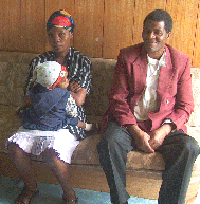“Some men change after mediation when they learn that women also have rights.”
- Coordinator Bazamile Magubane
In cases such as domestic violence, maintenance, neighbour disputes and child custody, many clients prefer to use the mediation services which the support centres offer, rather than the less flexible system of police and courts. As well as the speed compared to the slow court process, many clients - for example victims of domestic abuse - prefer mediation because it relies on persuasion and consensus and enables relationships to be rebuilt.
Mediation is not about being weak or allowing excessive compromise, but about making both parties reasonably happy and attempting to solve problems through dialogue. It saves time, money and anxiety, and is often a longer-lasting solution.
If a client chooses mediation, coordinators insist on speaking to both parties, advising them on how to resolve future conflicts and trying to preserve and reconcile relations as much as possible. By adopting a neutral stance and explaining the protections and punishments provided by the law, and using the threat of protection orders and arrest if necessary, they solve an increasing number of disputes, educating the parties involved in the process.
Coordinators conduct follow-ups by telephone and home visits to check on whether the settlement reached is still in place.
In 2011, 22% of cases were mediated, and of the 1287 mediations conducted, 1 125 were successful - a rate of 87%. Success is here understood to mean that after three months or more, the parties to the dispute are still satisfied with the resolution reached at the support centre.
| “The coordinators consider the whole person and their own unique social background and life experience, overlapping emotions and different needs. Each case is as individual as the person, so there is no ready-made or easy answer. Dealing with clients in this way requires courage, compassion and understanding.” - Angelika Piechulek, visiting German Masters student |
Read examples of mediation
 Through mediation, the aggressor is often able to understand that they did something wrong, and is drawn in to a realisation of the importance of human rights and of their responsibilities to others. Coordinators have reported cases of severe domestic violence where mediation has produced remarkable results, with the abusers apologising, living peacefully with their families and becoming an advocate of human rights. These men in turn talk to their friends and encourage them to avoid harmful conduct within their families.
Through mediation, the aggressor is often able to understand that they did something wrong, and is drawn in to a realisation of the importance of human rights and of their responsibilities to others. Coordinators have reported cases of severe domestic violence where mediation has produced remarkable results, with the abusers apologising, living peacefully with their families and becoming an advocate of human rights. These men in turn talk to their friends and encourage them to avoid harmful conduct within their families.
In cases where the abuser shows no sign of behaviour change, and where coordinators judge that further physical harm is likely, they inform the perpetrator more bluntly of the legal consequences of their actions and advise the client to take out a protection order or to lay a charge. Coordinators  have developed strong ties with their local police and once a charge is laid, an arrest swiftly follows.
have developed strong ties with their local police and once a charge is laid, an arrest swiftly follows.
The strength of mediation is that the wishes of the victim are firmly adhered to, and that where possible the re-establishment of healthy relations between people is pursued. This approach of making decisions in the light of future relations between parties is connected to customary African law.
Over the last few years, fewer cases that are mediated by coordinators have reached a stage where protection orders must be issued, which indicates the success of the process. Apart from domestic abuse, the most common disputes that were mediated during 2009 related to child maintenance.
A Political Science student from the USA, Catherine Lamme, observed mediation at CCJ in 2009 and wrote this:
"I realised that there hadn't been enough support given to mediation. I didn't understand the importance of working outside the legal system. I am so used to the idea from the US of breaking up the family if there is abuse rather than fighting to keep it together. The amount of forgiveness and understanding from the coordinators was humbling. They made me question my assumptions - was the formal legal system always the best way? Is it really wrong to stay with an abusive man? I have adapted my opinions to be more understanding of the family as an institution."